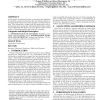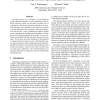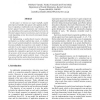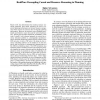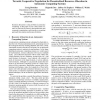130
click to vote
WWW
2010
ACM
15 years 2 months ago
2010
ACM
In this paper, we present Fastrack, a parameter-free algorithm for dynamic resource provisioning that uses simple statistics to promptly distill information about changes in workl...
134
Voted
SIGMETRICS
2010
ACM
15 years 2 months ago
2010
ACM
This paper addresses the problem of distributed resource allocation in general fork and join processing networks. The problem is motivated by the complicated processing requiremen...
130
click to vote
SIGCOMM
2010
ACM
15 years 2 months ago
2010
ACM
This paper proposes an architecture for optimized resource allocation in Infrastructure-as-a-Service (IaaS)-based cloud systems. Current IaaS systems are usually unaware of the ho...
118
click to vote
CCGRID
2010
IEEE
15 years 3 months ago
2010
IEEE
Markets of computing resources typically consist of a cluster (or a multi-cluster) and jobs that arrive over time and request computing resources in exchange for payment. In this p...
119
click to vote
OSDI
1994
ACM
15 years 3 months ago
1994
ACM
This paper presents lottery scheduling, a novel randomized resource allocation mechanism. Lottery scheduling provides efficient, responsive control over the relative execution rat...
133
click to vote
ICMAS
1998
15 years 3 months ago
1998
In this paper, we discuss two major tradeoffs, spatial and temporal tradeoffs, that appear when applying marketbased computing to multimedia network applications. The former appea...
123
Voted
AAAI
2000
15 years 3 months ago
2000
Recent work has demonstrated that treating resource reasoning separately from causal reasoning can lead to improved planning performance and rational resource management where inc...
162
click to vote
IJCAI
2003
2003
Towards Cooperative Negotiation for Decentralized Resource Allocation in Autonomic Computing Systems
15 years 3 months ago
Resource allocation is a key problem in autonomic computing. In this paper we use a data center scenario to motivate the need for decentralization and cooperative negotiation, and...
109
click to vote
MASCOTS
2004
15 years 3 months ago
2004
Grid computing is the future computing paradigm for enterprise applications. An enterprise application running on a grid is composed of a set of SLA-constrained sub-tasks demandin...
115
Voted
IJCAI
2007
15 years 3 months ago
2007
Although there are some research efforts toward resource allocation in multi-agent systems (MAS), most of these work assume that each agent has complete information about other ag...
